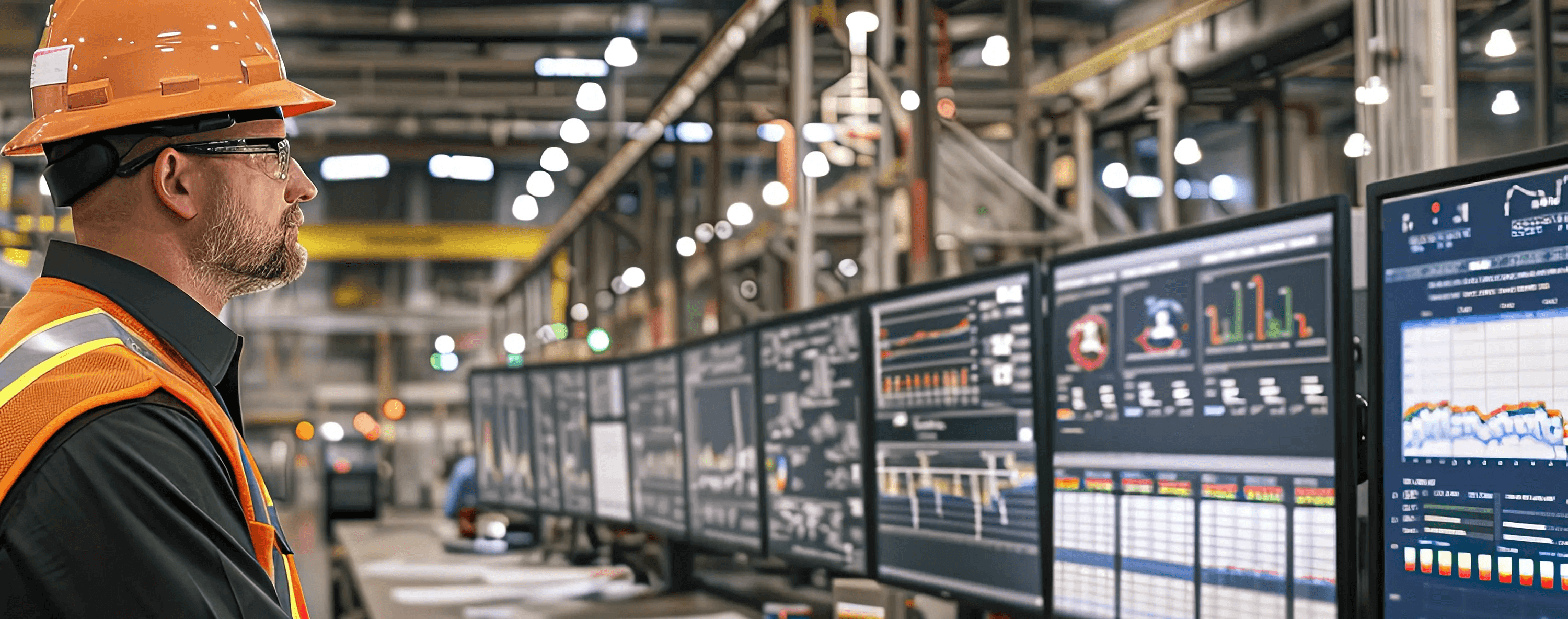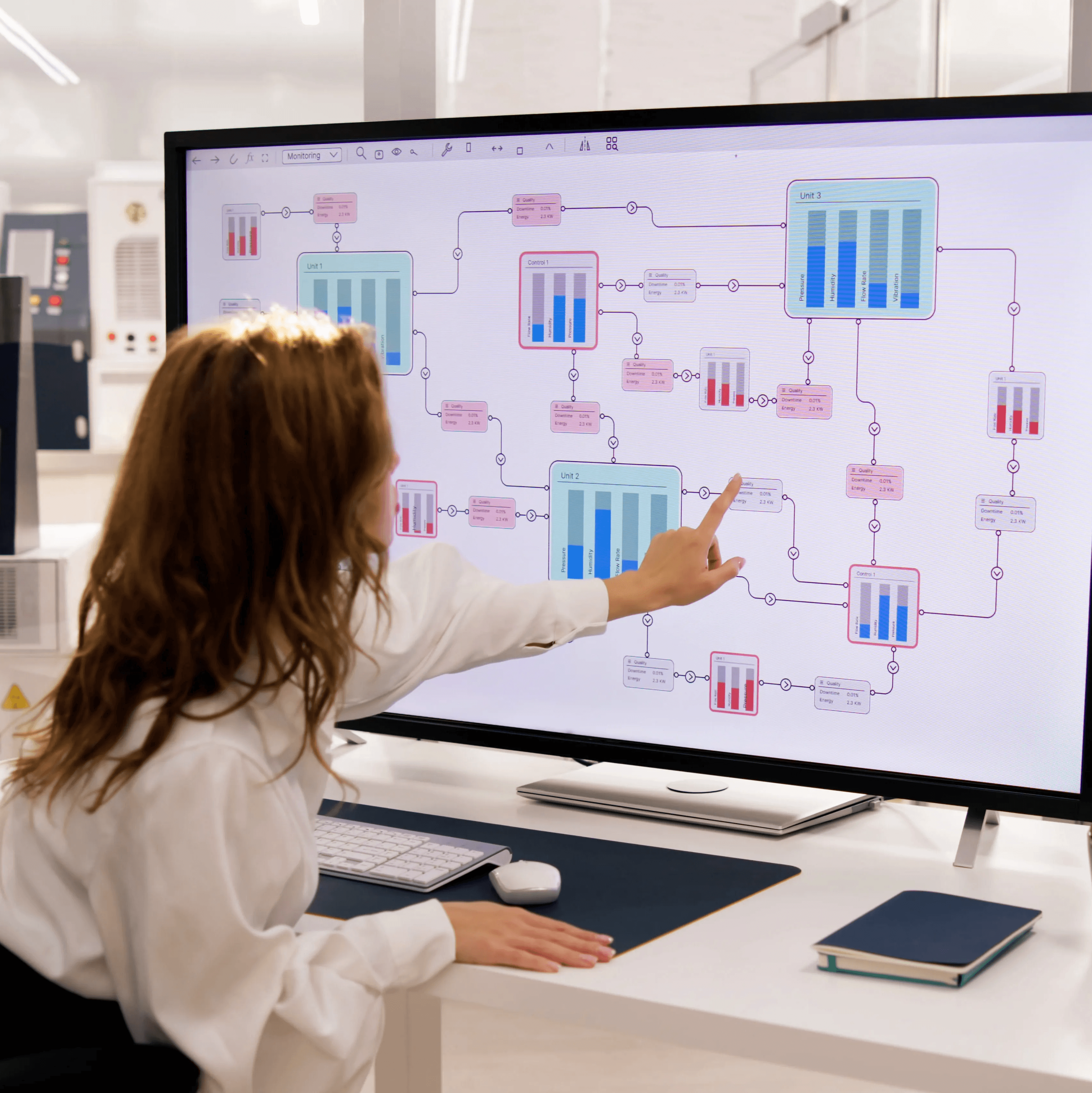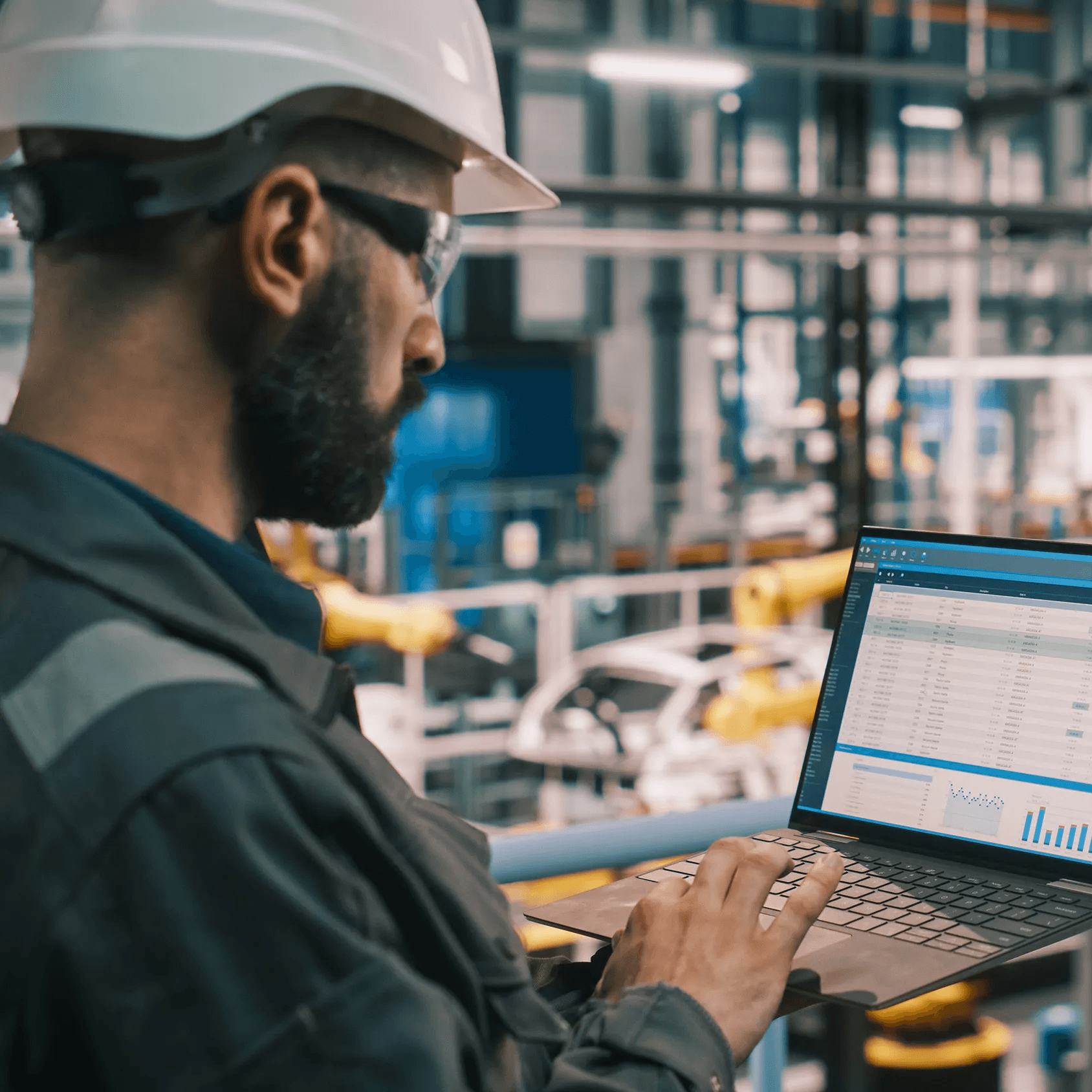
#growth
The platform that grows with you
By making the leap into the digital age, you will stay ahead of your competitors who are stuck in the status quo. You can be more nimble in responding to short-term changes and more responsive in implementing your ideas. This gives you an edge in the battle for market share and customers - and you can use IoT technologies and services as a gateway to new, innovative business models.
What is the Internet of Things (IoT)?
In the Internet of Things, sensors, trackers, IoT platforms and apps exchange information - even machines are involved. They monitor processes independently, collect data, analyze it and make appropriate decisions. In doing so, they adhere to clear rules that you have previously defined.
IoT and cloud computing go hand in hand
Your company has a wealth of data flowing through it. This data might include the location of parts on the factory floor, movement data from logistics, or readings from production. Microsoft Azure IoT makes this data visible. With the powerful cloud-based IoT platform, you can analyze your data, act on it, and make more informed decisions. In the cloud, you can tailor storage and compute capacity to your needs: Perfect for processing massive amounts of data. That's why IoT and the cloud are such good friends. Your data is collected, structured, and analyzed through interfaces. You can then view the results on custom dashboards and mobile apps. So you can keep an eye on everything, even when working from home or on the road: You can spot variances early and respond to negative trends immediately. Your team can take timely countermeasures to avoid logistics delays or production losses. Increased process efficiency frees up your specialists to focus on creativity and conceptual ideas.

Weitsichtig, damit Sie nie den Überblick verlieren
Verbringen Sie viel Zeit damit, Dinge zu suchen? Mit Object Trackern können Sie praktisch jedes Objekt überwachen und verfolgen - und Ihre wertvolle Zeit somit effizienter nutzen. Maschinen, Werkzeuge, Werkstücke und sogar flüssige Substanzen lassen sich so vernetzen. Zum Paket gehören eine mobile App, die Internet of Things-Plattform und eine eindeutige Kennzeichnung für jedes einzelne Objekt. Dazu kann man zum Beispiel QR- oder Barcodes verwenden. Das ist eine einfache und kostengünstige Methode, um verteilt gelagerte Werkstücke zu identifizieren oder technische Daten abzurufen. Mit Funktechnologien wie GPS, Bluetooth oder Low Range Wifi (LoRa) finden Sie jedes Objekt, selbst auf einem weitläufigen Gelände oder in unübersichtlichen Lagern.
READ MORE

Organisiert, damit Ihre Projekte vorankommen
Wenn im Projektgeschäft der Überblick fehlt, dann fühlt sich das nicht gut an. Dabei ist es manchmal schwierig, alles im Blick zu behalten. Arbeiten zum Beispiel viele Mitarbeiter*innen gleichzeitig an einem Projekt, müssen Sie darauf vertrauen, dass die Projektfortschritte zuverlässig zurückgemeldet werden. Vertrauen ist gut, aber digitale Lösungen sind eindeutig besser. Machen Sie Ihre Prozesse einfacher und bis zu 30 - 40 % schneller. Die gewonnene Zeit kann Ihr Team in andere Aufgaben investieren, die Ihr Projekt weiter voranbringen. Moderne Technologien stellen außerdem sicher, dass alle Projektdaten rechtzeitig und in der erforderlichen Qualität vorliegen. Ihr Team erhält neue Aufgaben digital, und jeder Fortschritt wird per Knopfdruck erfasst – keine Unterschriften, keine Laufzettel. So entlasten Sie Ihre Mitarbeiter*innen und bringen mehr Zuverlässigkeit und Geschwindigkeit in Ihr Projektmanagement.
READ MORE
Vorausschauend planen, damit es keine Überraschungen gibt
Ungeplante Stillstände sind für Sie ein Albtraum? Dann setzen Sie sicher alles daran, solche Situationen zu vermeiden. Zum Beispiel, indem Sie Verschleißteile lange vor ihrem technischen Lebensende austauschen, was jedoch weder wirtschaftlich noch nachhaltig ist. Und am Ende kann man Ausfälle trotz aller Vorsicht doch nicht ganz vermeiden. Wir haben eine bessere Lösung. Was wäre, wenn Sie Ihre Maschinen und Anlagen ständig überwachen könnten? Wenn Sie jederzeit wüssten, wie stark einzelne Teile belastet sind und wie lange sie noch halten? Moderne IoT-Technologien messen Vibrationen, Druck, Lärm, Betriebstemperatur und weitere Leistungsmerkmale. Bei der vorausschauenden Wartung (Predictive Maintenance) werden diese Werte zusammen mit anderen Faktoren genau unter die Lupe genommen. Die präzisen Informationen helfen Ihrem Team, optimale Wartungstermine zu berechnen, geplante Stillstände auf ein Minimum zu reduzieren und unvorhergesehene Ausfälle ganz zu vermeiden.
READ MORE
Sicher, damit Sie keine Überraschungen erleben
Die Sicherheit Ihrer Daten steht an erster Stelle. Und an zweiter. Und an … Sie verstehen, worauf wir hinauswollen. Das Internet of Things verbindet Cloud-Dienste, Unternehmenssoftware, mobile Lösungen und physische Geräte. Dadurch entstehen enorm große Datenmengen. Microsoft Azure schützt all diese Daten mit einem mehrstufigen Sicherheitskonzept. Zusätzlich sind alle Microsoft-Rechenzentren nach strengen EU-Datenschutzrichtlinien zertifiziert. Aktivitäten und Datentransfers werden immer verschlüsselt. Und nach dem Microsoft-Datentreuhänder-Prinzip bestimmen Sie, wo Ihre Daten gespeichert werden – zum Beispiel nur in dem Land, in dem Ihr Unternehmen tätig ist. Weitere Sicherheitsmaßnahmen helfen, Risiken und Datenverluste zu vermeiden und Hackerangriffe abzuwehren. So können Sie sich ganz auf Ihr Geschäft konzentrieren, während wir uns um Ihre Sicherheit kümmern.
READ MORE
Integriert, damit Sie von Ihren Daten profitieren
Angenommen, Sie könnten mobile Apps, IoT- und Cloud-Lösungen ganz einfach in Ihre bestehenden Systeme einbinden. Wenn die Technologien perfekt aufeinander abgestimmt sind, benötigen Sie keine komplizierten Schnittstellen. Ihr Team profitiert sofort von durchgängigen Prozessen. Die Daten Ihrer Sensoren und Messgeräte werden automatisch ausgewertet und erscheinen an den richtigen Stellen im System. Wie das funktioniert? Ganz einfach: All unsere IoT-Technologien basieren auf Microsoft-Lösungen und unterstützen gängige Kommunikationsprotokolle wie MQTT sowie Datenformate wie JSON und XML, um Ihre Maschinen und Sensoren anzubinden. In einem System, in dem alles vernetzt ist, ist es ein Kinderspiel, eine einheitliche Datenhaltung aufzubauen und diese auf höchstem Niveau zu sichern.
READ MORE

For large and medium-sized companies
Many large and midsize companies are using the Internet of Things to streamline processes and improve transparency. But IoT can do even more. Imagine using modern technologies to develop entirely new business models. For example, by adding digital services to your products. Instead of just selling machines and systems, you could offer guaranteed mileage or usage-based billing models. Your customers will love this new flexibility, but your competitors probably won't. Predictive maintenance is a similar idea. It combines machines and systems with digital services to enable precise, on-demand maintenance. It is important to get involved with IoT technologies early and gain your own experience.

Features
- You take pressure of your team by avoiding unnecessary tasks.
- You benefit from machine data in real time.
- You inspire your customers with digital products and services.
- You make better decisions with reliable data.
- You build robust supply chains with IoT technologies.
- You gain more insight into your production process.
Apps and connections for IoT, cloud & IT services
Be part of our COSMOs
Expand your COSMOs and register in our customer portal for exclusive benefits & services
#myCOSMO
Found what you were looking for?
Start your intelligent search now


